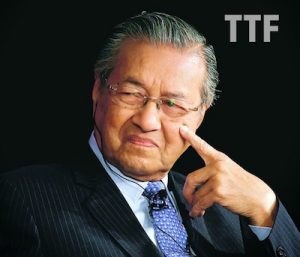
Following is an article published by NST Online complete with responses by TTF (in blue):

PUTRAJAYA: Tun Dr Mahathir Mohamad is expected to meet with relevant stakeholders tomorrow to discuss on the issue of petrol and diesel supply.
TTF: In other words, Tun Dr Mahathir Mohamad is going to meet Tun Dr Mahathir Mohamad and his children to discuss on the issue of petrol and diesel supply.
NST: The prime minister said he would discuss the matter with Petrol Dealers Association and petrol station operators to find the best ways to resolve the matter at hand.
TTF: Yes, yes…that means having a reunion dinner with family members to discuss oil…
NST: “They will meet us and we will discuss with them. We will together find the solutions,” he said at a press conference after Bersatu ended its general assembly today.
TTF: …over diner, perhaps in Mirzan’s or Mokhzani’s or even Mukhriz’s house…
And I’m not kidding.
On the 31st of August 2018, I wrote:
Mahathir spent his entire political career opposing the aristocratic culture.
He believed that the concept of succession by kinship as practiced by rulers was outmoded and reflective of ancient Hindu cultures that did not apply to Muslims.
Ironically, he spent the same career practicing favouritism of kinship by dishing out contracts to his children without calling for proposals through open tenders.
According to Section 23 of the MACC Act, it is an abuse of power for one to use his (or her) position in public office to make a decision or take an action for the benefit of himself (or herself), his (or her) kin or associate.
Mirzan Mahathir is Dr Mahathir Mohamad’s son.
Mahathir, on the other hand, is the Prime Minister of Malaysia.
Yesterday, the Government of Malaysia (GoM) was accused of Cronyism and nepotism following reports that the Ministry of Finance appointed a Petron Malaysia unit as fuel provider for government vehicles.
Mirzan owns shares in both Petron Malaysia (PEM) and its parent concern, Petron Corporation (PCOR).
On the 15th of December 2010, a Philippine conglomerate specialising in food and beverage, San Miguel Corporation (SMC), exercised a share option that gave it 68.3 percent of PCOR’s stakes.
A press release by Petron Malaysia dated the 5th of June 2013 confirmed that Mirzan did indeed hold substantial shares in the holding company and was a member of its board.
If that isn’t enough to convince you that Mirzan is behind PEM, several sections of PCOR’s and SMC’s by-laws stipulate that one needs to be a shareholder in order to sit on the directorial board of any of its companies.
Mirzan was elected director of PCOR on the 13th of August 2010.
That should put to rest any doubt that the son of Mahathir is indeed a stakeholder in the largest oil refining and marketing company there is in the Philippines.
What this means, is that Mahathir may have abused his position in office if indeed it can be proven that he directed the Ministry of Finance to appoint an oil and gas unit belonging to his son as fuel provider for government vehicles.
On the 1st of June 2018, I wrote (in red):
Early in January 2013, a large number of Malaysians became confused when Petron Corporation (PCOR) commenced the rebranding of almost 600 Esso and Mobil gas stations nationwide. These stations were inherited by PCOR through its acquisition of ExxonMobil’s downstream business in 2012 with EXCEL Petroleum, an industrial lubricant concern. The acquisition turned Mirzan Mahathir into a major petrol pump operator and the largest competitor there was to Petronas, an oil and gas giant fully owned by the Government of Malaysia (GoM).
I added:
By virtue of PCOR’s holding of ExxonMobile’s downstream business – or, business that concerns marketing, refining and retail operations, Mirzan has somewhat of an exclusive say in the way retail is handled across the Peninsula of Malaysia, Sabah and Sarawak. He does not, however, have access to ExxonMobile’s oil exploration, extraction, shipping and wholesale operations, activity that brings in ten times more profit than retail. That access was provided to him in 2013 though through a massive network of associations that involved his brother, Tan Sri Mokhzani Mahathir.
Finally, I said:
Mokhzani’s flirt with the oil and gas industry began with Kencana Petroleum Berhad, an integrated engineering and fabrication oil and gas production outfit that specialised in building and supplying drilling rigs. Despite being the record holder for providing the world’s tallest movable wellhead platforms, the company lacked deepsea drilling technology on par with what the Chinese had developed for exploration in the South China Sea. Mokhzani began looking for partners who could provide the service and knowhow but refused to consider Petronas as an option.
Mokhzani’s father, Mahathir, was sore that Najib had not revived plans to build a crooked bridge to replace the Malaysian side of the Johor-Singapore causeway. The whole purpose of the bridge was to force Singapore into renegotiating Maritime Security arrangements with Malaysia in ways that would grant our country access to oil rich areas at the edge of the South China Sea. Najib’s refusal to revive the project made dealing with Petronas less appealing. While Mahathir sat contriving plans to oust Najib as a measure of vendetta, Mokhzani turned to his childhood friend and longtime associate, Tan Sri Shahril Shamsuddin.
FOR FULL DISCLOSURE, CLICK HERE.
Summarised, all of the above reads:
1. Mirzan Mahathir is already a major petrol pump operator in Malaysia and the largest competitor there is to Petronas.
2. Both he and Mahathir are opposed to appointing Petronas units as fuel providers for government vehicles as the oil and gas concern may still be dealing with companies involved with oil exploration, extraction, shipping and wholesale operations that may somehow be tied to Najib’s people.
3. As a result, the GoM brought Mirzan a step closer to becoming Malaysia’s “Petrol Pump King” by quietly appointing a unit belonging to him as fuel provider for government vehicles.
NST: On claims that few petrol stations had closed their operations without getting the approval from the relevant authorities, Dr Mahathir said he would look into the matter.
Earlier, Bumiputera Petrol Dealers Association of Malaysia (Bumipeda) president Datuk Abu Samah Bachik expressed concern that consumers might face difficulties in obtaining petrol and diesel as supplies are expected to run dry by Jan 1.
He said this stemmed from petrol station operators’ refusal to increase their reserve supply by the end of this month.
TTF: Of course they will refuse.
They’re uncertain of the pricing mechanism the government intends to use.
Their uncertainty stems from the government’s own indecisiveness and flip flops on how it plans to go about regulating and reviewing the price of petrol.
NST: Previously, the Finance Ministry announced that the retail price of petroleum products including RON95 would be cheaper from Jan 1 onwards.
Finance Minister Lim Guan Eng said this follows the move by the government to streamline the price of petroleum product prices on a monthly basis, in line with the global market price of crude oil.
Saying the move would prove to be more beneficial to consumers, Lim also announced that the government would be returning to a weekly float for the RON95 petrol price from Jan 1 onwards
TTF: Actually, the review was due to pressure by various quarters, including former premier Dato’ Seri Najib Tun Razak, who pointed out that the government had quietly been ‘taxing’ consumers by maintaining the price of petrol despite the dip in global fuel prices.
On the 22nd of December 2018, Malaysiakini wrote:
The Pakatan Harapan government has been imposing a fuel tax of 30 sen per litre on the rakyat since November, claims former prime minister Najib Abdul Razak.
“Yesterday, the Brent (crude oil) price was around US$52 per barrel.
“As a comparison, the Brent price when BN lost was US$73 per barrel and the price of RON95 was RM2.20 per litre.
“This means that since early last month, the Pakatan Harapan government has imposed a tax of RM0.30 per litre on RON95,” he said in a posting on his Facebook page today.
NST: On improving the welfare of smallholders in the palm oil and rubber sectors, Dr Mahathir said they should diversify their crops which could cushion the impact of low commodity prices.
TTF: Actually, it was Dr M’s own arrogance that led to the souring of relations between Malaysia and China.
This caused the palm oil industry a major setback as China quietly withdrew multibillion ringgit commitments to the purchase of oil palm products from Malaysia.
Thousands of smallholders and businesses suffered as a result of this with some planters even having to declare bankruptcy owing to loss of income and their inability to service loans.
On the 21st of August 2018, TTF wrote:
Due to Mahathir’s stupidity, China triggered a temporary ban on the signing of new deals with Malaysia and convinced Chinese premier Li Keqiang to cut down drastically on China’s purchase of Malaysian palm oil.
14. The move is set to impact on close to a million Felda settlers who, prior to the 14th general election (GE14), were told by Mahathir to reject Najib at all cost.
15. China has already undertaken to ban the import of durian and bird nests from Malaysia, a move that already is affecting over a hundred thousand planters, farmers, traders and land owners who’re involved in these businesses.
NST: “We want small or big estates to allocate a plot to grow agriculture produce including vegetables, fruits and others.
“If the price of commodity drops, they still can generate revenue from the alternative agriculture produce,” he added.
Dr Mahathir said this when asked to comment on Armada chief Syed Saddiq Syed Abdul Rahman’s calls to take strong actions against the European Union for banning Malaysia’s palm oil.
Source: NST Online
Mahathir to discuss petrol and diesel supply at family reunion https://t.co/qOJU8BoMQS
— Raggie Jessy Rithaudeen (@RaggieJessy) December 30, 2018



